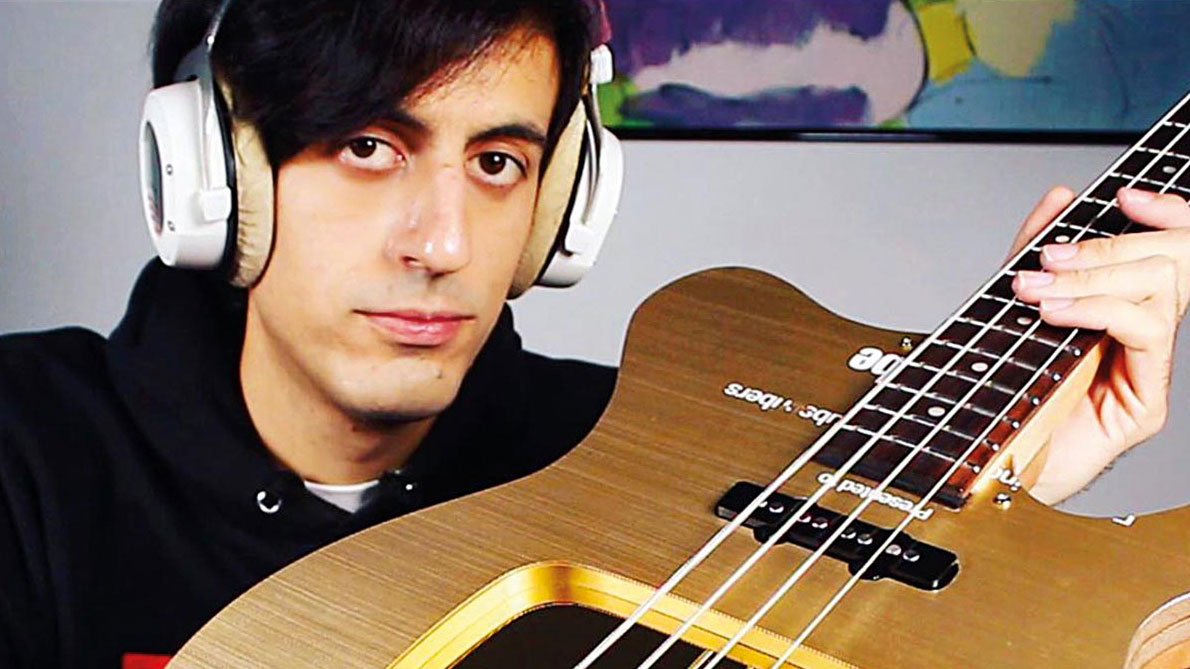Davie504: "Slap bass is still the best for making videos on YouTube, because it's very easy to hear, on any kind of speaker"
The internet's biggest low-end sensation on his remarkable bass journey so far – and what that '504' really means…

Over nine million subscribers tune in to Davide Biale, known to all as Davie504, on YouTube. He’s a phenomenal bass player, with a sharp sense of humor that gives his videos an edge.
In a rare interview, he tells us about his life before the internet came calling...
Davie, we know you were born in 1994, but no-one knows much about your early life.
“I grew up in a very beautiful town near the beach called Albisola Superiore, near Genoa in north-west Italy. Before bass I had other passions such as astronomy and geology: I loved to collect minerals. Italy winning the 2006 World Cup really inspired me to start playing soccer as a goalkeeper – I am very tall – and becoming one of the best goalkeepers was my goal.
“Unfortunately, while I was good in training, I just didn’t have the right mindset, and I would get very anxious while playing official matches, so after a few years I quit, and switched to bass. I was okay in elementary and middle school, but then I suddenly started getting very, very good grades in high school, right after I started playing bass. That’s the power of the instrument, I guess.“
I’ve read that you started playing bass in November 2009. Is this right?
“Correct. It all started because of a video game I used to play a lot: Grand Theft Auto: San Andreas. That game’s soundtrack is iconic, and there was one particular song that I always enjoyed listening to. After intensive research I managed to find out that the title of the song in question was Strutter by Kiss.
All the latest guitar news, interviews, lessons, reviews, deals and more, direct to your inbox!
“I did a quick search on YouTube and the first video that came up was a live version of it. Between all the band members, the bassist, Gene Simmons, really caught my eye, and made me interested in the instrument he was playing. Before that I didn’t even know what a bass guitar was.“
So video games led you to music?
“It’s crazy. I wanted to get more familiar with music and instruments and, since I was a gamer, I bought Guitar Hero – the perfect combination of music and video games. Unfortunately there were no Kiss songs in the version of the game I played, so, tired of playing random songs I didn’t like, I finally asked my parents if they could buy me a bass. They agreed and that’s how I first became a bass player.“
You now have over nine million subscribers on YouTube.
“It still blows my mind to think that I am the most subscribed Italian YouTuber – and it now looks like I might be the first Italian person to get up to 10 million subscribers! I can’t wait.“
Why do you think your videos are so popular?
“YouTube is always very unpredictable, so it’s hard to really understand what made my videos recommended and popular, but, throughout the years I’ve always managed to renew my content, keeping it fresh. I’ve constantly adapted my bass-oriented videos to popular trends all over the internet.
“I think adding humor to bass videos is ultimately the key reason why my channel got popular. Adding humor makes videos entertaining and fun to watch, whether you’re a bassist or not.“
Throughout the years I’ve always managed to renew my content, keeping it fresh. I’ve constantly adapted my bass-oriented videos to popular trends all over the internet
Slap bass is a subject of much sarcasm in your videos. Do you enjoy this playing style, in fact?
“A big part of my humor is making fun of popular musician stereotypes, so I make fun of playing bass with a pick – because it’s ‘illegal’ – and lots of sarcasm. I actually love to slap. It’s my favorite technique, but I like to overly joke about it and make it seem like it’s the only ‘right’ way to play bass. Obviously I support every technique on bass.
“Slap is still the best for making videos on YouTube, because it is very easy to hear, on any kind of speaker. Whether your viewer is using high-end speakers or a smartphone, they will always easily hear which notes and melodies you play. There are too many videos of bassists where you can barely hear what they are playing, and I found the solution in slap.“
Your videos with Charles Berthoud are hilarious.
“I discovered Charles in a series of videos I where I hired bassists on the internet, sent them a drum track and paid them to compose a bassline. He was labeled as a ‘Pro’ bassist on a website and it quickly became a tradition to hire him in every episode. He’s always played extremely well, and people demanded some kind of bass battle between us, which happened. To this day, it’s one of my favorite collaborations.“
What does the 504 in your name mean?
“Everybody always asks this question, and my answer always changes... but today I’m gonna tell you the truth. 504 is just my birthday date – the 5th of April. Shhh, it’s a secret. Don’t tell anybody.“
Good-quality video and good-quality audio are a must. My advice is to study what other successful YouTubers are doing and try to adapt their concepts to the content you want to make
A lot of our readers will be interested in making a career on YouTube. Can you give them some advice?
“Good-quality video and good-quality audio are a must. My advice is to study what other successful YouTubers are doing and try to adapt their concepts to the content you want to make. Most of the time you have to be prepared to compromise and find a balance between what you like and what the general audience likes.
“For example, there was a period when the video game Minecraft was trending, to the point where every video featuring that game would get millions of views – so I played Minecraft and I recreated all the sound effects using my bass. Be aware of trends on the internet, adapt and include them in your own unique way in your videos.“
How do you handle negative comments online?
“Luckily I have a very thick skin, and I’m able to just ignore negative comments. Actually they usually make me laugh: Most of the haters are just people who don’t understand sarcasm and think that when I say, 'Don’t play with a pick or I will call the cops and steal your bass,' that I’m serious.
“When my channel was small I mostly had positive comments, but once the channel started gaining some traction, some people seemed to dislike that. It’s almost like once something becomes popular, some individuals are going hate it just for the sake of it.“
What bass gear do you use?
“I have more than 60 bass guitars and some of them are very crazy – 36-string bass, quadruple neck, and so on – so if I started to list them all it would take forever. Some of my most iconic basses are the Fender Jazz I used in my first videos, and the Music Man Sterling I’ve been using in the past year.
“Because I’m always travelling, I don’t use much musical gear. I just use a sound card and that’s it. All the basic effects I use – compression, EQ, reverb – are done in my recording software, Ableton, and Pro Tools.“
Since I went full-time on YouTube, I’ve never played live except for a performance at Rock in Rio
Talk us through your filming and editing setup.
“The process changes depending on which type of video I want to make. The hardest part is to get a good, interesting idea. Once I get that, half of the job is already done. Before I even start working on a video, I already have in mind what the title and thumbnail of the video are going to be.
“It’s very important to have a clear vision of what you want to achieve. I then proceed to search for material to show or talk about. After that, I write a script. Once I’ve finished writing the script, it’s time to shoot the video.
“First I shoot the parts where I talk to the camera and then I proceed to do the musical parts and play the bass. Because I just have one camera I usually shoot multiple takes to get different angles, so the video can be a little more interesting and dynamic.
“Once I have all the footage and audio recorded, I transfer everything to my computer and I start editing in Final Cut Pro. When I first started making 10-minute videos, this process would take more than 40 hours, but nowadays I can finish everything in five to six hours. You have to be quick. Trends don’t last forever and the faster you can make a video, while maintaining good quality, the better.“
Do you have staff who help you with this?
“No. I’ve always done everything, from editing, shooting, graphic design, audio mixing and mastering, by myself. When I need some high-quality drawing in my thumbnails, my girlfriend will help me.
“I’ve tried to hire video editors in the past, but my editing style is unique and it never worked out too well when other editors were involved. It would be like hiring another bassist to play my parts – it just doesn’t feel right.“
Do you ever play live shows?
“I used to play live shows with my band when I first started playing bass. Since I went full-time on YouTube, I’ve never played live except for a performance at Rock in Rio. I was called to perform there as a solo act. I didn’t really have any experience, so going there was a crazy thing to happen.“
Who is the greatest bass player ever?
“Victor Wooten.“
Many times, I’ve felt my channel was going to be forgotten and, a week later, my channel would go viral
What have been the high and low points of your career?
“The highest point of my career on YouTube was in April 2020, where my channel got almost 70 million views in that month alone. I managed to be near those numbers for well over a year and half, which in YouTube time is a lot of time. The lowest point: I’m not sure.
“Something that a lot of YouTubers have in common is the constant uncertainty of what’s going to happen next. Many times, I’ve felt my channel was going to be forgotten and, a week later, my channel would go viral, and so on. It’s important not to give up at low points and to keep improving yourself. Success will come to you!“
Joel McIver was the Editor of Bass Player magazine from 2018 to 2022, having spent six years before that editing Bass Guitar magazine. A journalist with 25 years' experience in the music field, he's also the author of 35 books, a couple of bestsellers among them. He regularly appears on podcasts, radio and TV.






